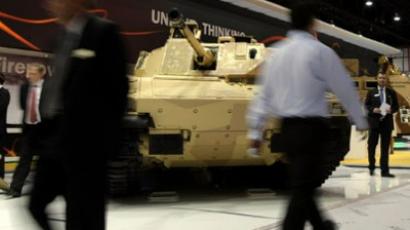Keeping China at bay: UK, Japan strike arms deal
Japan and Britain have agreed to an unprecedented arms deal - Tokyo’s first such arrangement with a country other than the US. Amid fears of Western expansion in Asia Pacific, some analysts say the region will welcome a counterbalance to Chinese power.
Kicking off his tour of Japan and Southeast Asia on Tuesday, British Prime Minister David Cameron clinched a defense weapons deal with his Japanese counterpart Yoshihiko Noda.The move represents Tokyo’s first attempt to develop such weapons with a country other than the United States.Short on details, Cameron and Noda vowed to launch at least one weapons program that would “contribute to both our countries’ security and peaceful intent.” The British government had previously proposed joint projects in several fields, including the auto-loading system for 155mm Howitzers.Both leaders also agreed to conduct joint troop exercises under the specter of an impending North Korean rocket launch.Japan’s subsequent easing of arms export rules further reflects its desire to boost its military presence on the global stage.For its part, London is following lock and step with Washington, where increasing commitments in the Asia-Pacific region is a priority.Following an announcement last November that 2,500 US troops and aircraft would participate in rotating deployments out of a de facto base in northern Australia, Washington also hopes to station four new combat vessels in Singapore.Plans to build a new military base in South Korea and station US forces in the Philippines have further led to accusations that Washington is encircling China.America’s unfolding strategy might stir anti-imperialist sentiments, political analyst Joseph Cheng told RT. Countries in the region are increasingly relying on the West due to their own security shortcomings. “These countries are apparently adopting a kind of hedging strategy. They certainly do not want to confront China at the moment, and they do not have the resources to build up their respective military strengths to counterbalance China.”Cheng says the decision to rely on the United States and “involve more foreign powers in the region” is a means “of maintaining some sort of multilateral balance and exerting the pressure of the international community on China.”James Corbett, editor of the Corbett Report, told RT that Western focus in the region is a natural response to changing global power dynamics.“As China obviously continues to be an economic powerhouse, and even India and other countries in the region threaten to become more economically dominant, with that comes the attention from the militaries of the US and the UK,” he said.But Corbett believes the apparent intimidation of China by the West is only occurring on the surface. Saying economic interdependence makes military confrontation less likely, Corbett argues “this type of military aggression is played up as a way of milking more money out of the American taxpayers … in order to fund the American military machine and to justify a new type of battle front.”However, unless China upsets the balance of power by attempting to retake Taiwan, Corbett says “the actual danger of outright military confrontation again remains quite low.”














